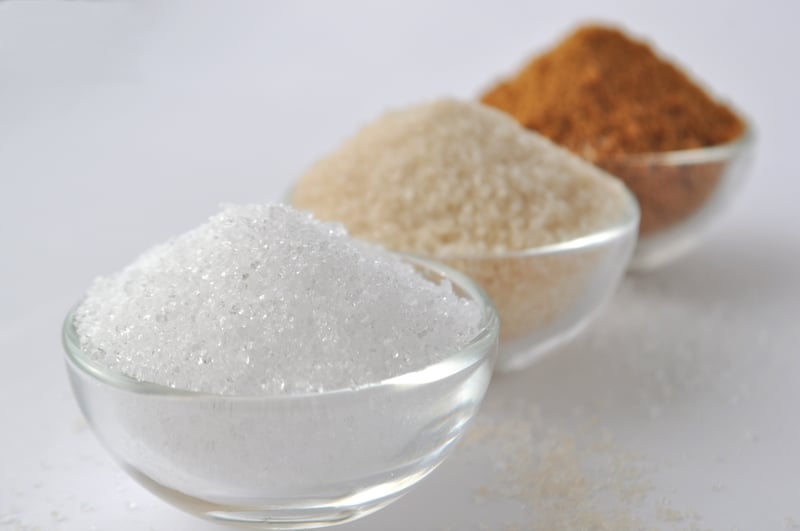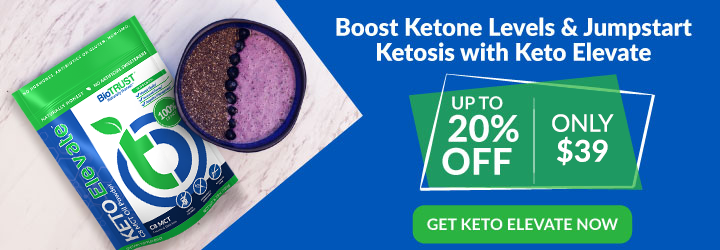The 3 Best Sugar Substitutes (and 4 You MUST Avoid)

You’ve surely seen the headlines that overconsumption of sugar leads to all sorts of ills, including weight gain, obesity, diabetes, insulin resistance, cavities, increased hunger, high blood pressure, heart disease, nutrient deficiencies, skin issues, cognitive decline, and the list goes on. And perhaps you’ve even vowed to yourself to give it up for good (instead, swapping for the best sugar substitutes in its place). Only to unthinkingly pop another sweet treat into your mouth moments later…
After all, refined sugar is the epitome of empty calories. It has zero nutritional value—no amino acids, no essential fats, no vitamins, no minerals, and no antioxidants. For most people, there are no reasons, nutritionally speaking, to include it in the diet and a long, long list of reasons to avoid it.
So, if you know all this, why do you keep eating it?
Why Do We Crave Sugar?
It turns out that “sugar is a deep, deep ancient craving,” according to author and evolutionary biologist Daniel Lieberman at Harvard University.” 1 You see, it appears that by seeking out sweet foods, our ancestors were able to decrease the likelihood of starving to death as these calorie-dense foods provided the energy needed to survive and procreate as well as additional energy to store for times when food sources were low.
While being good at taking in sugar and storing it as fat was a big advantage for our ancestors, it’s become a health risk for those who have an abundance of food so readily available.
After all, our idea of “hunting and gathering” is typically just a drive to the nearby supermarket, convenience store, or drive-thru. Often, we don’t even have to get out of our vehicles to load up with enough food for ourselves, our families, and even for community gatherings.
Simply put, we’re biologically programmed to like and, yes, even crave sweets. And while that had an evolutionary advantage, in the modern day of abundance and accessibility, it’s a health liability.
With the rare exception of honey, our ancestors likely satisfied their sweet cravings by eating seasonal or sometimes dried fruits and sweet vegetables (like carrots, fennel, sweet potatoes, squash, corn, etc.), which were largely dependent on where they lived. Obviously, international shipping was very limited if even existent.
Thanks to technological advancements, we’re also surrounded—if not bombarded—by seriously sweet, sugar-heavy treats calling to our evolutionary desires.
Why eat in-season carrots, berries, or mango slices when it’s so easy to get an instant shot of sweetness with a tall glass of soda, a decadent donut, or a crave-worthy cookie? It’s not surprising that sugar consumption has gotten out of control (an average of 22.2 teaspoons per person per day 2).
The absolute best answer is to satisfy the vast majority of our sweet cravings with unprocessed whole foods—like a nice bowl of sweet berries, a sliced-up mango, or a slightly green banana—and some people are amazing at doing just that. (We strive to be more like them!)
If you can’t (or just don’t want to) go all the way to cutting out refined sugar, then cutting back is another great option. But, what should you do when you crave cake, donuts, candies, oh my?
A couple of the more popular options include simply lowering the amount of sugar in a recipe. For instance, with many recipes, you can easily cut the amount of sugar by a quarter, half, or more with no problems. And, you could opt for the best sugar substitutes. Here are our top options.
The 3 Best Sugar Substitutes
1. Stevia
From the South American plant Stevia rebaudiana, this zero-calorie sweetener is 100 to 300 times sweeter than sugar (so a little goes a long way) but doesn’t affect blood sugar levels. Studies have found that stevia comes with no adverse health effects and may provide some potential positive effects. 3, 4
It works well in just about any recipe as it can be baked and frozen without losing sweetness lending more credence to Stevia being one of the best sugar substitutes. Just remember that it is sweeter than sugar, so you likely will need a lot less stevia than sugar. Fortunately, you can find conversion charts easily online.
There are numerous brands out there with varying amounts of the different sweet compounds extracted from the plant—which can affect the taste. Depending on the brand and how it is prepared, stevia can have a bit of an aftertaste, so if you find you don’t like one brand, it’s worth trying another. One of my personal favorites, which I’ve been adding to my coffee for years, is SweetLeaf®. They have a number of different flavors (like chocolate raspberry and vanilla) that taste delicious.
2. Erythritol
Next on the best sugar substitutes list is erythritol. A sugar alcohol, erythritol provides just .24 calories per gram (or 6% of the calories found in sugar). Because the body lacks the enzymes to break it down, a substantial portion passes through the small intestine undigested. 5 This also means that unlike refined sugar, it doesn’t seem to affect blood pressure, insulin, cholesterol, or triglyceride levels. 6
And many people have found that it tastes very similar to sugar, so it’s an almost undetectable switch. And unlike many of the other sugar alcohols, it tends to be well tolerated, as it doesn’t seem to result in nearly as many digestive complaints, such as gas or bloating. 5, 7
If you are new to baking with erythritol, you may want to seek out recipes that have already been made using this ingredient (like these pecan delights, lava cake, or apple tart) as it behaves differently than sugar and may take some trial and error if you want this to be your best sugar substitute. It’s often recommended to use no more than a ½ cup in your recipe to avoid crystallization or dryness in your baked good.
3. Monk Fruit Extract or Luo Han Guo Fruit Extract
Up to 250 times sweeter than sugar, monk fruit extract provides 0 calories, carbohydrates, sodium, or fat. Antioxidants called mogrosides account for the sweetness level. 8 It doesn’t affect blood sugar levels, doesn’t appear to have any negative side effects, and is “generally recognized as safe” (GRAS) by the Food and Drug Administration (FDA) even for children and pregnant and breast-feeding women. 9
Plus, you can find granule, liquid, and powder forms; however, because it comes from Southeast Asia/southern China, it isn’t as readily available and may be more expensive than others on the list of best sugar substitutes. And like stevia, some people, though not all, find it also has an aftertaste.
Other Sugar Substitutes to Consider
Raw Honey. With ~310 calories per 100 g, honey does not cut back on any calories, so you’ll want to use it sparingly. It also isn’t as sweet as sugar. However, unlike the empty calories from refined sugars, honey does provide some nutritional value, including enzymes, antioxidants, amino acids, and electrolytes. Much research has suggested it may have healing properties, especially for wounds as well as relief from coughs. 10, 11 It should not, however, be used by children under a year old.
Dates. Again, these dried fruits are not low in calories, but they are high in nutrition, including fiber, potassium, vitamins, minerals, and phytonutrients, and are surprisingly versatile for baking recipes.
Yacon Syrup. With a consistency like molasses, yacon syrup offers a sweet taste with just one-third of the calories found in refined sugar. Its carbohydrate content is up to 50% fructooligosaccharides (FOS), which are prebiotics that help feed the beneficial bacteria in the gut. One small study did show that yacon syrup helped overweight women lose weight (although more research is needed). 12
Research also suggests increasing consumption of FOS may decrease ghrelin (the hunger hormone) levels, which may help improve appetite control and decrease cravings for sugary junk foods. 13
So, why didn’t yacon syrup make the best sugar substitutes list? The biggest drawbacks for yacon syrup is that it cannot be used for baking as it breaks down. Also, large quantities can lead to gas, diarrhea, and gut discomfort. So, it’s better to use small amounts for sweetening drinks or stirring into yogurt or oatmeal.
Xylitol. Another popular option is xylitol, or birch sugar (though it can be extracted from corn as well as birch wood). It has 40% fewer calories than common refined sugar while providing the same level of sweetness; however, it appears to only minimally raise blood sugar levels without affecting insulin levels. 14 Plus, it has been shown to help prevent tooth decay. 15 And it may also help increase calcium absorption, which can be good for the teeth and bones. 16
It does have a few drawbacks, however, as ingesting large quantities can lead to gas and even diarrhea. Beware, xylitol can be extremely dangerous to dogs, leading to severe liver damage. So, if you have dogs, please be extra cautious to ensure they don’t eat any accidentally.
Other options worth considering include coconut sugar, maple syrup, and molasses. While they won’t reduce the number of calories when compared to sugar, at least they are not completely empty calories, as they do provide some nutritional value, including antioxidants.
4 Sugar Substitutes to Avoid!
Now that we’ve gone through the best sugar substitutes, it’s time to review those you’ll want to limit, if not avoid at all costs, namely artificial sweeteners like sucralose, aspartame, acesulfame potassium (AceK), and saccharin.
While they also provide the sweetness of sugar without the surge of glucose, insulin, or calories, these chemical concoctions are just as likely, if not more likely, to prevent you from reaching your weight-loss goals, and they have been connected to a slew of scary side effects.
In fact, they have been shown by research to have a negative impact on weight loss. In addition, they have been shown to reduce the number of good bacteria in the gut, which can lead to digestive discomfort, skin issues, low energy levels, lower immunity, difficulty losing weight, and suboptimal metabolic function
.
Fortunately, our list of best sugar substitutes includes several readily-available choices like stevia, erythritol, monk fruit extract, and more to help you stay on track while satisfying those sweet cravings you were born with!







